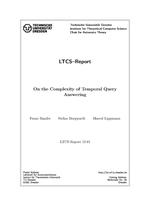On the Complexity of Temporal Query Answering
From International Center for Computational Logic
On the Complexity of Temporal Query Answering
Franz BaaderFranz Baader, Stefan BorgwardtStefan Borgwardt, Marcel LippmannMarcel Lippmann
Franz Baader, Stefan Borgwardt, Marcel Lippmann
On the Complexity of Temporal Query Answering
Technical Report, Chair of Automata Theory, Institute of Theoretical Computer Science, Technische Universität Dresden, volume 13-01, 2013. LTCS-Report
On the Complexity of Temporal Query Answering
Technical Report, Chair of Automata Theory, Institute of Theoretical Computer Science, Technische Universität Dresden, volume 13-01, 2013. LTCS-Report
- KurzfassungAbstract
Ontology-based data access (OBDA) generalizes query answering in databases towards deduction since (i) the fact base is not assumed to contain complete knowledge (i.e., there is no closed world assumption), and (ii) the interpretation of the predicates occurring in the queries is constrained by axioms of an ontology. OBDA has been investigated in detail for the case where the ontology is expressed by an appropriate Description Logic (DL) and the queries are conjunctive queries. Motivated by situation awareness applications, we investigate an extension of OBDA to the temporal case. As query language we consider an extension of the well-known propositional temporal logic LTL where conjunctive queries can occur in place of propositional variables, and as ontology language we use the prototypical expressive DL ALC. For the resulting instance of temporalized OBDA, we investigate both data complexity and combined complexity of the query entailment problem. - Bemerkung: Note: See http://lat.inf.tu-dresden.de/research/reports.html.
- Forschungsgruppe:Research Group: AutomatentheorieAutomata Theory
@techreport{ BaBoLi-LTCS-13-01,
address = {Dresden, Germany},
author = {Franz {Baader} and Stefan {Borgwardt} and Marcel {Lippmann}},
institution = {Chair of Automata Theory, Institute of Theoretical Computer Science, Technische Universit{\"a}t Dresden},
note = {See \url{http://lat.inf.tu-dresden.de/research/reports.html}.},
number = {13-01},
title = {On the Complexity of Temporal Query Answering},
type = {LTCS-Report},
year = {2013},
}
